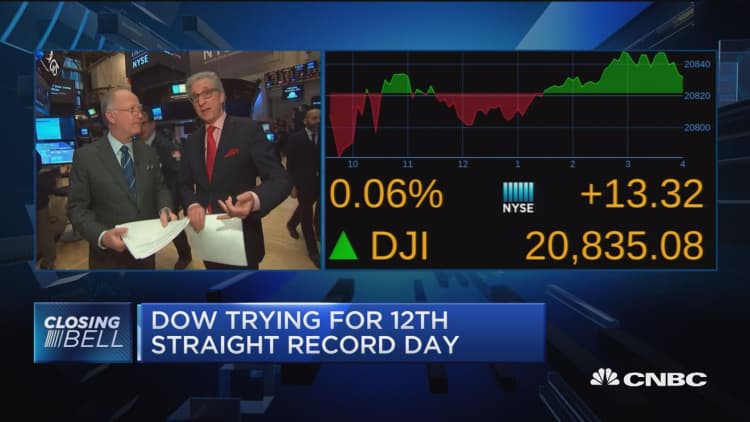
Traders are trying hard to figure out not just how the Donald Trump agenda is playing out, but also how it collides with another very large entity in Washington, D.C.: Janet Yellen and the Fed.
Yellen is speaking at the Executives Club of Chicago on Friday, one day before the Fed enters a blackout period, during which all of the central bank's officials will be quiet ahead of its meeting on March 14 and 15.
So, this will be the last shot she has at summing up the state of the economy.
Here's the issue: Trump is proposing spending programs that seem to imply the economy is weak and in desperate need of help.
But Yellen doesn't see it that way. The economy is clearly in a recovery mode, and she seems ambivalent about how much additional fiscal stimulus the economy might need.
What Yellen and company think about the Trump plan matters a lot. If Trump gets his way and suddenly we have a large tax cut — with additional spending hikes in the form of defense spending and infrastructure — it's likely the Fed will view that as a notable risk to their inflation outlook, just as it looks like they might finally be getting to that elusive 2 percent target.
That means it's far more likely the Fed will get much more aggressive raising rates—we could be talking about the possibility of four rate hikes this year.
So how this plays out is critical because the Fed's commentary is going to color trader perceptions.
And what Trump is saying — or what Trump's associates are leaking — cannot help but make the Fed worried about: 1) a sharp increase in defense spending, 2) leaving entitlements unchanged, and 3) a "big statement" on infrastructure spending.
And over the weekend, the talk was that the border adjustment tax (BAT) — which House Speaker Paul Ryan's plan relies on for offsetting revenue — was dead or dying because it cannot get through the Senate.
Sure sounds to me like there is going to be massive deficit spending coming!
If you don't think this is a problem for the Trump administration, you're kidding yourself. Last night, Elaine Chao made her debut as Transportation secretary at the National Governor's Association. Here's what she had to say about the infrastructure spending: "Everybody wants a better transportation system, but very few people want to pay for it, so that's a big conundrum,'
Sounds to me like everything is still on the table on this one: an increase in the gasoline tax or some other "pay to play" plan. Tax credits and other ways to get the private sector involved in some kind of "public-private partnership," including more use of private toll roads. Using corporate profits returned from overseas.
What's likely to happen? Over the weekend, traders were acting like they were throwing down some kind of ultimatum to President Trump: it's put up or shut up time on the Trump rally, Mr. President. He can't get away with vague promises of cuts in taxes, less regulation, and a big infrastructure plan anymore. We need details, and we need them now.
What nonsense. That bluff has already been called.
My bet is that traders are wrong—that Trump will again call their bluff and disappoint on the details. He will keep up the Big Theme story.
And Yellen? Same story — I expect her to be as vague as possible about raising rates in response to fiscal stimulus, simply because Trump is not showing her anything. It's in her best interest to allow the Fed to have as much flexibility as possible. The message will be very much like the one conveyed to Congress: the economy is improving, the job market is strong, inflation is creeping toward out 2 percent objective.
This, of course, makes the trading community nuts. It was widely noted on trading desks this morning that 2-year yields are up sharply and one measure of the Fed's likelihood to raise rates in March is over 5 percent probability. One catalyst: Fed voting member Robert Kaplan saying "sooner rather than later means in the near future" in response to a question.
That tells me the markets are convinced there could be sparks coming soon between the President and the Fed.


